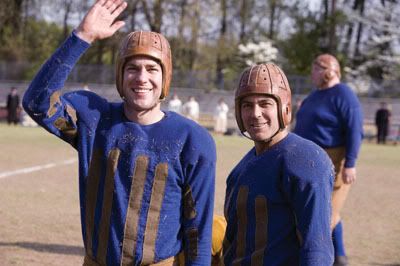
Leatherheads chronicles the early days of professional football, but it's not really about sports at all. Though set in 1925, it's a throwback to the screwball comedies of the 1930s and '40s, films made by men with legendary names like Hawks, Capra and Sturges. Had George Clooney been their contemporary, we might now be saying his name in the same breath.
It's been obvious for some time that Clooney has a serious case of nostalgia. Just look at his meticulous recreation of 1950s newsrooms in Good Night, and Good Luck. (2005). Or take his choices as an actor: the old Hollywood glitz and glamour of the Ocean's series; the cerebral science fiction of Solaris (2002); the gritty '70s-style drama of Michael Clayton (2007). When it comes to Leatherheads, every frame drips with a longing for simpler days, when fewer rules made football more fun and, more importantly in this case, the strict Production Code imbued movies with an innocence rarely seen since. (The screwball comedy has been defined as a sex comedy without the sex.) Even the characters' names seem to cry out from the past: Dodge Connelly, Lexie Littleton, Carter "The Bullet" Rutherford.
College football is big business in 1925. Fans pack stadiums to see Princeton star Carter (John Krasinski, better known as Jim on The Office), a war hero said to have single-handedly caused the surrender of an entire German platoon. After a game, reporters ask him what he will do after his final year of college ball. "You could always go pro," one suggests. There is a pause, then all share a hearty laugh.
Pro football hasn't exactly reached the stature of the college game. Players compete with cows for playing space. Games resemble brawls more than organized contests. "Star" players are often middle-aged men, such as Dodge Connelly (Clooney) of the Duluth Bulldogs. With his team in danger of folding, Dodge hatches a plan to recruit Carter. Meanwhile, the Chicago Tribune sends reporter Lexie Littleton (Renee Zellweger) on the road, ostensibly to do a profile of Carter. Her real assignment is to sniff out the war hero story; a soldier who served with Carter says it isn't true.
Naturally, Dodge and Lexie meet, and Dodge falls hard for her. There's also chemistry between Lexie and Carter. Dodge seems outmatched by the younger Carter, whose all-American, nice-guy image seems too good to be true. And, of course, there is Carter's massive celebrity, which quickly legitimizes pro football. His likeness adorns a giant banner outside of the stadium. Inside, he appears on advertisements covering every inch of wall space, shilling razors and other products. His face even stares back at you from the official game clock on the scoreboard. The rivalry between Dodge and Carter is both on and off the field, culminating in one of the most entertaining fistfights ever committed to film.
Clooney directs from a script by longtime Sports Illustrated writers Duncan Brantley and Rick Reilly. He also allegedly did an extensive rewrite and left the Writer's Guild of America after it would not allow him to share the credit. Squabbles like this are unfortunate because the witty dialogue, delivered with verve and precise timing, especially by Clooney and Zellweger, is the the movie's greatest strength. Whoever is responsible for it deserves recognition.
If Clooney took his cues mostly from Steven Soderbergh, his primary creative partner during the past decade, for his first two directorial efforts (Confessions of a Dangerous Mind [2002] and Good Night, and Good Luck.), Leatherheads draws more from his collaborations with the Coen brothers. A similar nostalgia and offbeat (by today's standards, anyway) comedic sensibility runs through O Brother, Where Art Thou? (2000), which drew inspiration from both Homer's Odyssey and the 1941 Preston Sturges film Sullivan's Travels, and the less successful Intolerable Cruelty (2003), which dabbled in the screwball comedy arena.
Clooney seems so comfortable with this material, as both an actor and director. As Dodge rides his motorcycle (complete with sidecar!) wearing his battered old leather jacket, it becomes evident that Clooney has a timeless quality about him as an artist. Watching him bounce off Zellweger, who lends Lexie the feisty temperament that drove Chicago's Roxie Hart, is pure joy. It appears he also has rubbed off on Krasinski, who becomes a big screen star in this movie.
The only thing detracting from Leatherheads is that it runs just a few minutes too long. It doesn't quite fit with other sports movies as we've come to know them, yet it still climaxes with The Big Game At The End. There is no real way around it, I suppose, and Clooney does his best to wring laughs from the players and referees trying to get a handle on the many new rules that stem from the government's sudden involvement in pro football.
Clooney has better films than this on his resume and I suspect he will do better in the future. But Leatherheads is a delightful diversion that only increases the likelihood of him being known as the greatest movie star of his era.
GRADE: B
(Rated PG-13 for brief strong language. 114 minutes.)
No comments:
Post a Comment